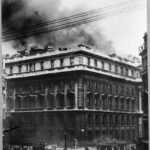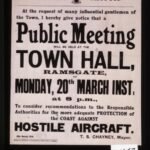![German propaganda poster with a vibrant and striking image depicting swarms of British aircraft bombing an industrial site to illustrate the following quote, by British Labour Leader Johnston Hicks [sic], which appeared in the 'Daily Telegraph' on January 3rd 1918: 'One must bomb the Rhineland industrial regions with one hundred aircraft day after day, until the treatment has had its effect!’](https://airminded.org/wp-content/uploads/2024/03/artv05099.jpg)
In the previous post, I discussed some of my objections to the idea that the air raids on Britain in the FIrst World were the ‘First Blitz’. I don’t think my arguments were completely persuasive, even to myself (which is why I decided to work through them in public like this). But I ended by saying I had another concern, and this one I think carries more weight. However, it’s not really about the First World War at all, but the Second. And it’s this: the Blitz is too British.
So, as is well-known the term ‘the Blitz’ was a contemporary coinage to describe the Luftwaffe’s attacks on British cities in late 1940 and early 1941, which persisted in popular and historical discourse after the war. The singularity of the term essentially marks it as a British experience. While we now speak (or write) of the ‘Baedeker Blitz‘ in 1942 or the ‘Baby Blitz‘ in 1944, the wartime references to, for example, the Rotterdam Blitz have fallen away.1 The Blitz was something that happened to Britain, or more specifically to the British people, something only reinforced by the importance of the ‘Blitz spirit’ in British popular memory and national identity.
But of course, while the Blitz was a British experience in its detail, and should certainly have a central place in our understanding of Britain’s war, it was not at all a unique experience in its broad outlines. Even leaving aside Abyssinia, Spain and China in the 1930s, many countries were ‘blitzed’ in the Second World War, by the Allies as well as (indeed, more than) by the Axis. In absolute terms, two of them, Japan and Germany, were bombed much more heavily than Britain itself; a third, Italy, had about the same number of civilian casualties from bombing over the course of the war as did Britain. None of these other bombing campaigns get a special term in English-language historiography; they are just another part of their wartime experience. Only Britain gets to have the Blitz. It’s the implicit comparison for all other bombing campaigns. And that’s a problem.
This is not an original idea. De-centring the Blitz from our understanding of strategic bombing in the Second World War was one of the objectives of the outstanding Bombing, States and Peoples in Western Europe 1940-1945 project which wrapped up over a decade ago. One of the most important outputs of Bombing, States and Peoples was Richard Overy’s magnum opus, The Bombing War: Europe 1939-1945 (London: Allen Lane, 2013), which treats the Blitz in some detail but as just one of a number of bombing campaigns which struck and sometimes shattered wartime societies and economies across Europe during the war, including not only Germany and Italy but also France, the Soviet Union, and Malta, and more.2 Some of these nation’s experiences of air raids resembled those of Britain in some ways, but very often not in others, which is hardly surprising given the greatly varied political, geographical and strategic contexts involved.
What I am leading up to is that I am thinking of the First World War as a bombing war, too. It’s not just that, once again (or rather for the first time) Britain’s Zeppelin and Gotha raids dominate both English-language history and memory of strategic bombing in the First World War, to the detriment of our understanding of what happened in Germany, France, and Italy especially. It’s also that these early bombing campaigns did not unfold in isolation, but reacted against each other, and against other developments in the war too.3 Add to this the role of popular emotions in driving these responses, thanks to the need for governments to maintain support for the war effort, especially for production, and I think there is a case to made for looking at the First World War as an (embryonic) bombing war – the First Bombing War, if you will. I don’t think I can make that case fully in Home Fires Burning, since it’s just me and not a team of international scholars writing what would need to be a transnational, emotional and military history. But I do think the First Bombing War is a better frame for me than the First Blitz.
Image: ‘What England wants!’, German poster (1918), Australian War Memorial ARTV05099.4
![]() This work is licensed under a Creative Commons Attribution-NonCommercial-NoDerivatives 4.0 International License.
Permissions beyond the scope of this license may be available at http://airminded.org/copyright/.
This work is licensed under a Creative Commons Attribution-NonCommercial-NoDerivatives 4.0 International License.
Permissions beyond the scope of this license may be available at http://airminded.org/copyright/.
- Oddly, the V-1 and V-2 attacks are less often referred to as a Blitz. [↩]
- The other key publications to come out of Bombing, States and Peoples were Claudia Baldoli, Andrew Knapp, and Richard Overy, eds., Bombing, States and Peoples in Western Europe 1940-1945 (London: Continuum, 2011); Claudia Baldoli and Andrew Knapp, Forgotten Blitzes: France and Italy Under Allied Air Attack, 1940-1945 (London: Continuum, 2012); and a special issue of Labour History Review (2012). [↩]
- See Andrew Barros, ‘Strategic bombing and restraint in “total war”, 1915-1918’, Historical Journal 52, no. 2 (2009): 413–431. [↩]
- Translated back into English, the quote reads ‘One must bomb the Rhineland industrial regions with one hundred aircraft day after day, until the treatment has had its effect!’ I haven’t been able to verify this alleged quote; nothing like it appears in the Daily Telegraph on 31 January 1918. Hilariously, Jix – a notorious arch-conservative – is here described as a ‘worker leader’! [↩]



